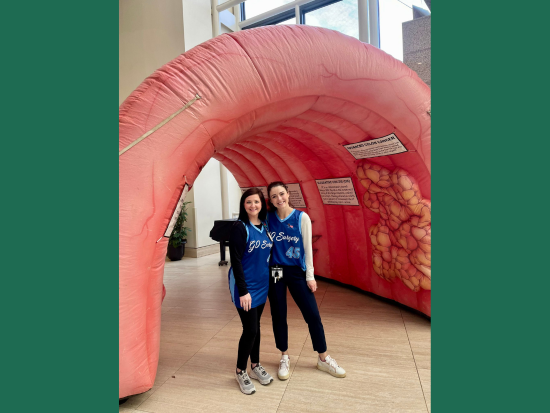 On March 7, 2024, the UAB Division of Gastrointestinal Surgery and UAB Employee Wellness co-hosted the annual Colon on The Corner awareness event for employees in the atrium of the Kinklin Clinic. The event featured a 16-foot inflatable colon, an interactive game area, and free coffee.
On March 7, 2024, the UAB Division of Gastrointestinal Surgery and UAB Employee Wellness co-hosted the annual Colon on The Corner awareness event for employees in the atrium of the Kinklin Clinic. The event featured a 16-foot inflatable colon, an interactive game area, and free coffee.
Physicians, surgeons, and other representatives were present to answer questions about the updated guidelines for screenings and additional measures we can take for early detection and prevention of colorectal cancer.
While at the event, Division of Gastrointestinal Surgery Assistant Professor Drew Gunnells Jr., M.D., took a few moments to discuss with us a few frequently asked questions that often arise when talking about colorectal cancer.
In our discussion, Dr. Gunnells reminds us that colorectal cancer is preventable and reiterates that early screening, beginning at 45 or younger, is key for detection.
Read the full interview here:
Why is it so important to get screened for colorectal cancer?
DG: “One of the primary reasons for undergoing screening for colon cancer is that it can not only find if you have a cancer but it can help prevent you from. having colorectal cancer in the future. This means that polyps can be removed before they develop into cancer, unlike other types of cancer that can only be caught in their early stages. Colon cancer can be identified before it turns into cancer, making it a preventable form of the disease.”
What are some effective screening methods for colorectal cancer?
DG: “Colonoscopies are considered the most reliable and effective method for detecting and preventing colon cancer. However, there are several other options available for people who cannot undergo colonoscopy such as stool test or imaging test. For more information on what option would be best for you, reach out to your primary care provider.”
What is one of the biggest barriers for patients when it comes to getting screened for colorectal cancer through a colonoscopy?
DG: “A colonoscopy is a relatively quick and safe exam that typically lasts between 15-20 minutes. However, the most significant hurdle to overcome is the necessary preparation required to clean the colon before the exam. This can involve adhering to a special diet for up to a couple of days and taking laxative medications to help clean the colon.”
How often should individuals get screened for colon cancer, and at what age should they start?
DG: “Patients who are at an average risk should start screening at the age of 45. It is advisable to consult with your primary care provider to determine if this applies to you. However, high-risk patients with a family history or certain comorbidities will need to start screening earlier.”
Are there any specific risk factors that increase the likelihood of developing colorectal cancer?
DG: “Patients with a family history of colorectal cancer, inflammatory bowel disease, or other genetic disorders will need to be screened earlier.”
Are there specific symptoms or warning signs of colorectal cancer that individuals should be aware of?
DG: “The most common warning sign of a potential health issue is the presence of blood in your stool. While it is often caused by benign conditions such as hemorrhoids or an infection, rectal bleeding is never normal and should be investigated by your primary care provider to determine the root cause of the problem.”
Can you provide any advice or recommendations for individuals, who may be at higher risk for colorectal cancer?
DG: “There are currently no definitive strategies to mitigate colorectal cancer in high-risk patients, such as a specific diet or pills. However, we recommend that patients undergo screening earlier than average-risk patients and follow healthy lifestyle recommendations.”
What lifestyle changes can individuals make to reduce their risk of developing colorectal cancer?
DG: “It is possible that taking certain measures can reduce the risk of developing cancer in general, such as reducing your alcohol intake, quitting smoking, engaging in regular exercise, consuming a high-fiber diet, and following a Mediterranean diet. However, it is important to note that these measures do not guarantee that patients will not get colorectal cancer, but they may lower their chances of developing the disease.”
Are there any advancements or emerging technologies in the field of colorectal cancer prevention?
DG: “One of the major advancements in the field of colorectal cancer is the early screening of patients, which can help in detecting polyps before they develop into cancer. Meanwhile, in the research aspect, we are currently working on determining the reason why patients develop colorectal cancer at a younger age and are identifying the potential causes, such as environmental factors, diet, or other unknown factors. We still need to conduct further studies and research to establish the exact cause of this trend.”